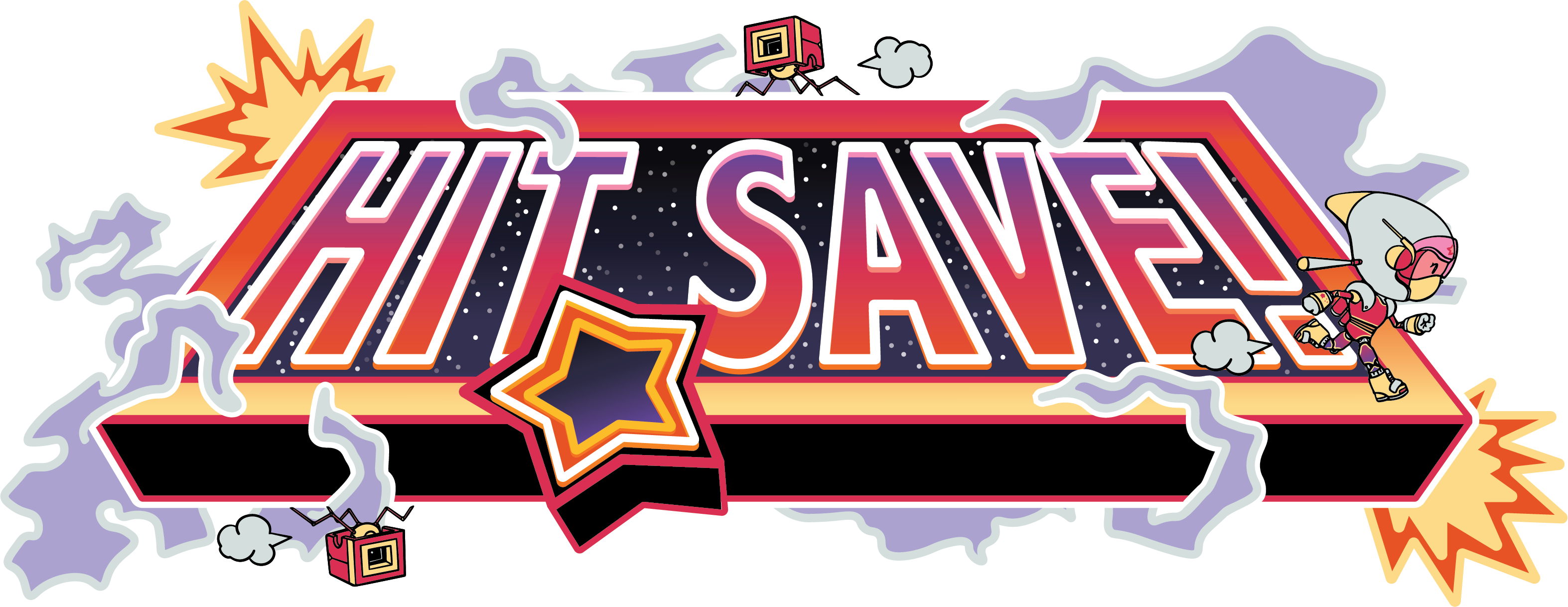Julián Quijano, Creative Director at Beautiful Glitch, the studio behind the Monster Prom series, didn't exactly set out to create the indie darlings that Monster Prom and Monster Prom 2: Monster Camp have become. He did know that he wanted some financial independence and to be creative, more specifically to write. So after studying advertising and public relations in school, Quijano joined an indie studio to learn as much as he could and after a year, when the gig came to its natural conclusion, he struck out on his own with big dreams and a modest savings.
"As I get into something (anything) I naturally start producing ideas," Quijano said. "Like, if I worked at a restaurant, I would have probably taken notes and brainstormed restaurant-related ideas for businesses. But since I was at a game studio, my mind went into that direction and over the months I had some silly ideas and a hunger for creating my own thing. When that job ended, I had some humble savings of my own and a very unrealistic notion of the cost of making a game, so I was reckless enough to try."
Creativity is always at least a little reckless and game development is no exception. Even though Quijano says that it was "reckless" to start up his own studio, a lot of the learning process for running Beautiful Glitch has been in slow, steady evolution.
"It is more of an organic slow process in which you keep learning every day. When looking back, there's a million things I see as they could have been done better. The best [that] I can do is [to make] real and constant efforts in being open to improvement."
Scaling up was another thing entirely. One of the biggest challenges that Quijano and his team needed to face down was how to take what they were building and scale it up in a sustainable capacity. Quijano admitted that they move more slowly than other studios with big successes under their collective belts because they'd rather scale up methodically than get too big too fast.
"It's complex to make operational choices wisely, especially when the value of our time changes often," Quijano said. "Looking back, I can think of a lot of tasks that we spent too much time on. This is closely tied with the scaling up thing. We're currently 4 people in the office, and until we manage to increase that number, any task has the risk of bottlenecking other tasks. This makes most choices very sensible."
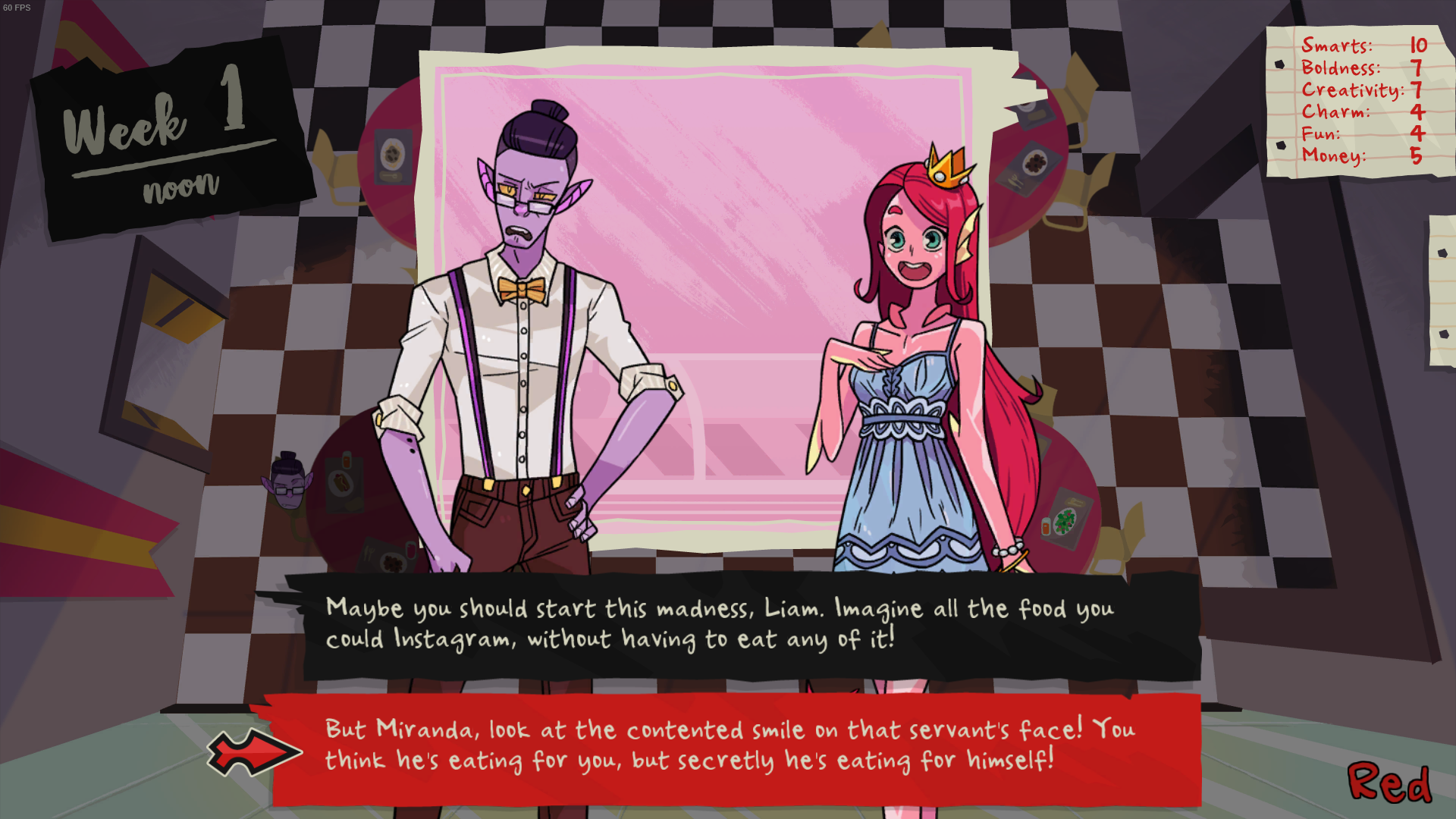
Small game studios often need to contend with these kinds of sacrifices in service of growth at their own pace. It demonstrates that even the smallest change in task management can create cascading issues for other areas of the studio. It also ensures that scope creep remains minimal -- Beautiful Glitch's games aren't meant to be sweeping, after all. Each game's narrative choices allow players to shape the story to their liking, so each choice, like each task, has to be meaningful and impactful.
Monster Prom, Beautiful Glitch's debut game, was released to critical acclaim after a very successful Kickstarter campaign. Visual novel fans were especially excited to have something as irreverent, delightfully funny, and deliciously cheeky to shape into the experience that they wanted to see. But, of course, the fans wanted more. While working on Monster Prom, Quijano and the team "dreamed a bit" about what an expanded Monster Prom universe might look like. There was even a Kickstarter update from 2016 that "mentioned the notion of Monster Camp," which is what Monster Prom 2 would eventually become.
"After the release of [Monster Prom], we decided to do a Kickstarter campaign specifically to get a better understanding of the interest in expanding this IP," Quijano said. "The response was overwhelming. As a result, we promised not one, but many sequels. We're committed to this, but truth to be told, we wonder often if we didn't go a bit overboard.
"We basically promised three to five more games within the IP. It's a lot! Good news is the only date promise we made was with the first sequel, which we actually fulfilled. Now, we could very well take five years per sequel, if that was needed. We still are trying to have swift processes and make the games in rather short periods; but knowing we have this freedom is a bit relaxing, especially because we want at some point to start working on other IPs too."
As Beautiful Glitch and Quijano moved through the development process for Monster Prom 2: Monster Camp, there were a number of areas where the development process diverged from how they approached the original Monster Prom's development. As a result, Monster Camp's development was "way cleaner and clearer" than Monster Prom's. It was an 18-month development period during which there was a significant (and obvious) evolution, especially in the last six to nine months.
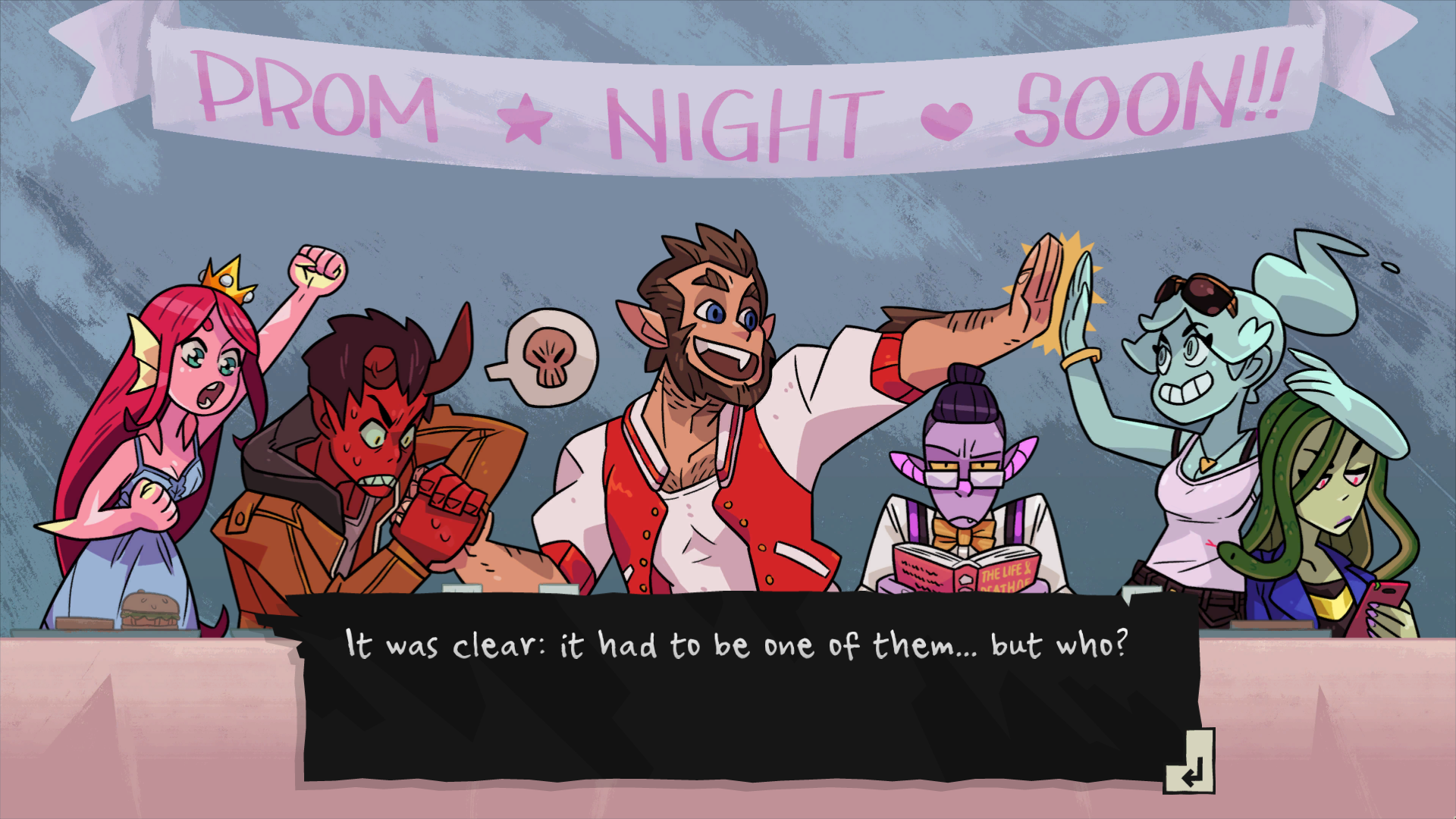
"In the last six to nine months, we implemented new systems and tools that eased everything a lot," Quijano explained. "It makes us very optimistic about the processes of future games. We're quite chaotic, to be honest. I'd say now we're a bit less chaotic!"
As many game developers will attest to, creating a demo is an immense hardship. Creating a playable, relatively stable vertical slice of a game (rather than focusing on the development of the game itself) is often months of hard work just to ensure that press and, in Beautiful Glitch's case, fans of the first game, can play it during a conference. In-person conferences may be still on hold in 2021, but even creating demos for online showings, as is the case for Steam Indie Festival or even for digital press junkets through Parsec, is just as daunting.
To add even more complexity, Quijano and his team at Beautiful Glitch needed to create two demos for Monster Camp: one for the Kickstarter, which was "more of an interactive promotion for the campaign" and another more robust demo for PAX West 2019. It took two to three months to get the PAX West demo well in-hand, but after that, the team could focus on developing the game itself.
"In Fall 2019, we delved more strongly onto the meat of production (art and narrative). In early 2020, we started to go more extensively on the programming. In [the] summer [of 2020], we started tackling orbital (yet very important) stuff, such as the credits' animation or promotional actions such as collaborating with artists. [We did] all [of] this while narrative and art kept focusing on main production. [It was around this time that] we started the post-production of narrative, which is big on a game like ours (reviewing everything for quality, sensitivity, and other reasons).
"By the middle of 2020, we sat and discussed if we should rush into an October release or wait. Our main issue was that due to the Winter holidays, missing October meant a February release at best. We decided we could leave some non-essential features (such as the gallery) for after the release (in actuality, it's what happened with Monster Prom too), and went for the October release. It made us very happy, as there's a special joy in delivering a game. There was (is) still work to do, but it feels different when you know the product is out there, and the audience seems to like it already."
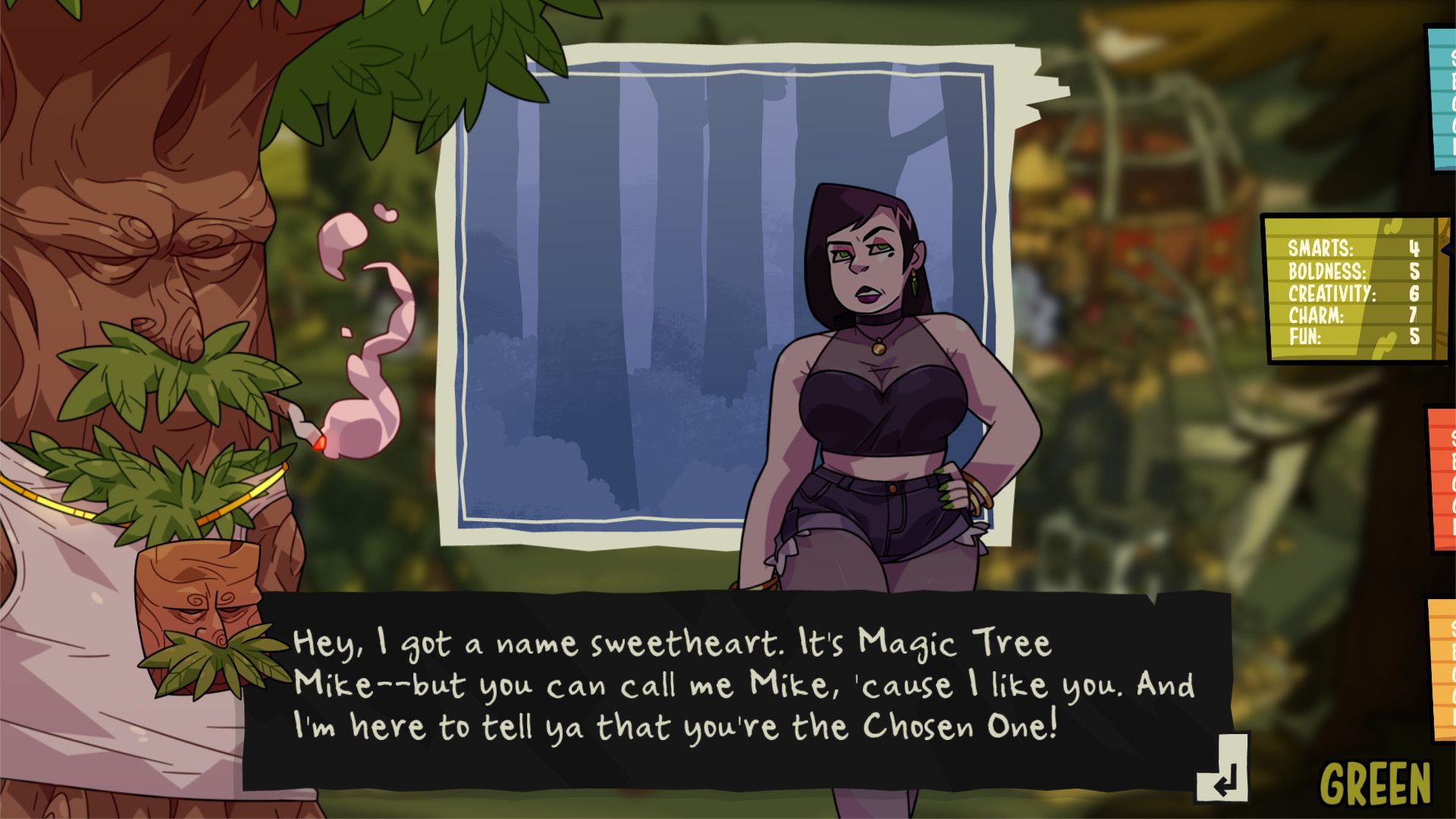
Monster Camp is measurably different from its predecessor in a number of ways, most notably in how the player can interact with the game and choose to woo the monster of their dreams. Quijano attributes this evolution as "symptomatic of [Monster] Prom's success." The team was able to be more whimsical, to indulge themselves, especially in art. Because Monster Prom was as successful as it was, and Monster Camp yielded quite a bit of support on Kickstarter, Beautiful Glitch had more resources and much more wisdom to draw upon. They were able to collaborate with guest artists and even have "some degree of animation in our credits sequence."
Most notably, at least to Quijano, was the ability to create "weird, beautiful stuff, like music," including an anime song.
"Then you can see the evolution in many parts, but especially in the narrative," Quijano noted. "We had a clearer vision of the IP's tone. My only concern is that content is longer, [which is] something we will try to correct a bit in future games); but the style is clearer and more consistent. We've [also] improved systems and processes, such as our sensitivity reading. Writing irreverent humor with a good message is always a challenge, and I get the feeling we've produced a more well-rounded product that isn't shy of packing punches, but that does so in a more sensitive manner. We even included a new feature that lets players filter some events out based on specific trigger warnings.
"Monster Camp feels more mature as a product and piece of fiction. We feel quite proud of the result not only on itself, but as a step forward from the first game. It has filled our hearts with joy to see that most of the Steam reviews praise the game for being not only good, but better than its predecessor."
As Quijano and his team at Beautiful Glitch look ahead to the future, and back at the commitment that they've made to the community, they're not quite ready to start in on the third installment in the Monster Prom universe, but they're certainly gearing up for it. While the plan is percolating, Beautiful Glitch is still focusing on the previous two games, in order to ensure that they're the best that they can be before moving forward with Monster Prom 3.
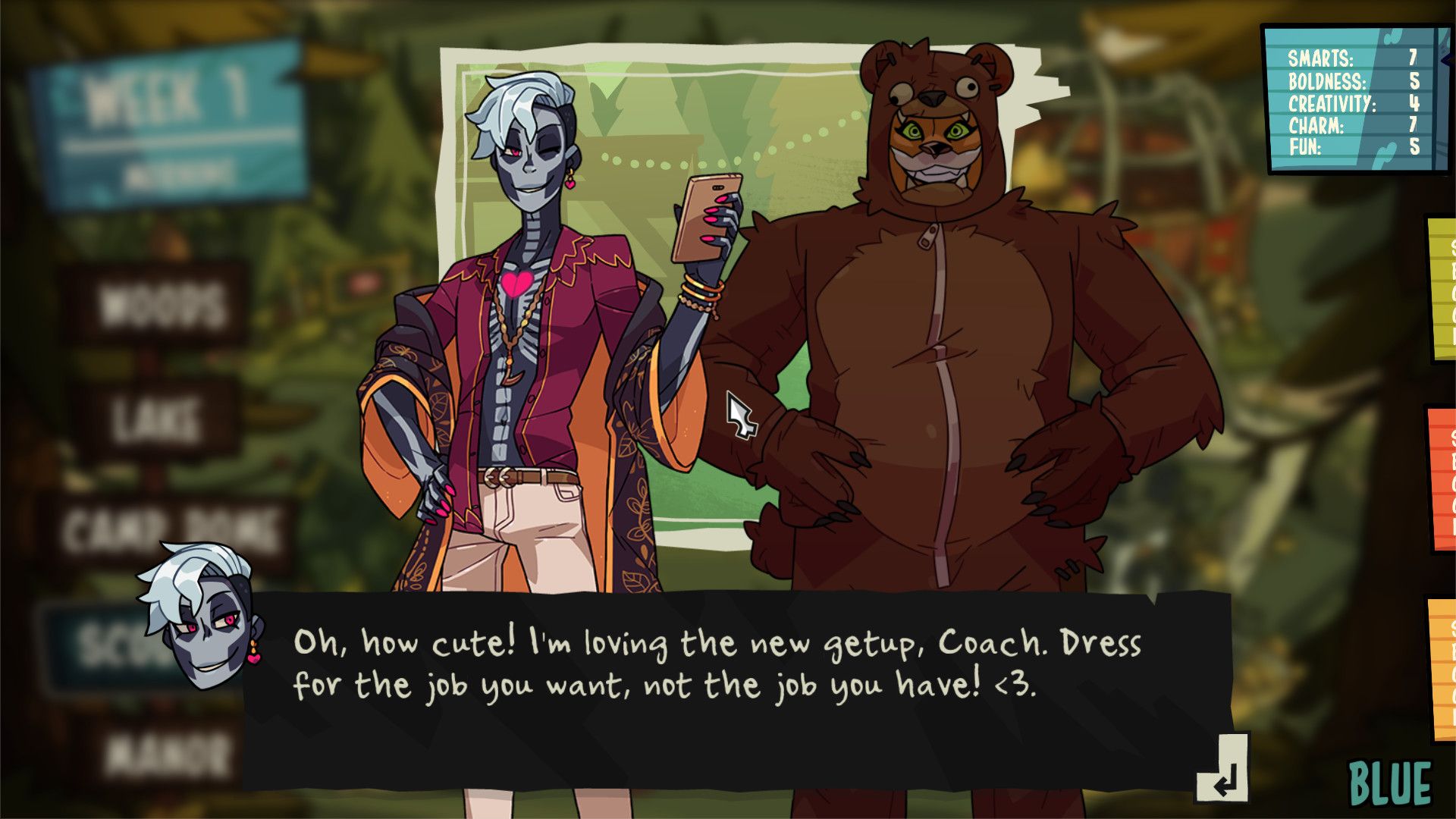
"We like these characters and would love to keep expanding the universe," Quijano said. "But, I must be honest and say that the task gives us some vertigo. The first two games (and DLC) add up to around 2,000 pages of dialogue, if I am correct. Every event has two options, and most times [it has] four outcomes. There are at least ten jokes per event... so we assume we've written probably more than 10,000 jokes easily."
Vertigo is certainly one way to orient an enormous narrative project like Monster Camp, and whatever the third installment in the universe will be. It isn't just the daunting task of making a game, either. It's making a humorous, sensitive game that is rooted in the irreverence that Monster Prom fans have come to love without losing the edginess that sets these characters apart from other visual novels. There's a lot of fear to contend with, especially the fear of not having more to give when there is more to write, more to do, more to create.
"At times, we feel the well will empty itself," Quijano admitted. "Already with Camp, we've felt at times we were exhausting a lot of variables. This has upsides and downsides. At our lowest, we wondered 'how much [further] can [this] go?' Humor is wonderful, but it's also some sort of system, like a limited (even if vast) set of possible formulas. It happens that we come with an absurd idea for a twist. And as incredibly absurd as it might be, we swiftly identify four to five other times in which a joke with a similar formula has been utilized.
"We've tried to remind ourselves that writing for Monster Prom is building a big iceberg and 90% of players will probably see 10% of it [in a given playthrough]. So what feels worn out for us, may not be for the players. It is indeed one of the things that scares us the most when working on the same IP. The upside is nice, though. By exhausting formulas, we force ourselves into exploring new paths, even some that seem a bit out of tone for the IP. This actually has helped Monster Camp to be a wonderful experience at times, as we've devised events that are weird and inventive in new ways, even if just narrative like setting the whole outcome of an event 300 years in the future through the conversation of a tavern keeper and a wanderer in Hell."
It won't always be a walk in the forest (or a dance at prom) for the characters in Monster Prom. Beautiful Glitch will be playing around with new genres, though will still firmly have roots in narrative. Quijano wants his team to be able to innovate more, to play with how to best express their vision through a multitude of mechanics.
"For Roadtrip, for instance, we want it to be a narrative game with survival mechanics," Quijano noted. "This is super exciting for us to think on new mechanics and how the narrative needs to adapt to it. But it's scary because it means that -- although we will keep specific mechanics to enable romance -- the game won't revolve so clearly on dating. We think this is exciting and a chance to explore more sides to the characters; but it scares us in alienating a fanbase who prefer the idea of flirting with the monsters instead of doing new things."
Keeping a studio afloat during the global COVID-19 pandemic hasn't been easy, especially for smaller studios. Thankfully, part of the perks of being small is also being nimble. Many of Beautiful Glitch's main collaborators are working remotely with the team in Barcelona, but Quijano is holding out hope that when vaccinations are widespread and the world opens up again, those collaborators will be keen to join them in their city, whether that's temporary or permanent. As Beautiful Glitch moves ahead with its plans for Monster Prom 3, alongside polishing up Camp and yes, even Prom, they're also working on brainstorming new intellectual property, exploring the possibilities of mobile, and cranking out the third installment of their "INDIE G ZINE" book.
"We hope by next year we're working on a new multiplayer game, on a new IP, and at least one smaller side project that's not a videogame. Anything that keeps us moving creatively gives us plenty of joy!"
Check out Beautiful Glitch on their official website, Facebook, and on Twitter. You can purchase Monster Prom (XXL) on Steam, GOG, Nintendo Switch, PlayStation 4, and Xbox One. Monster Prom 2: Monster Camp is now available on Steam.
